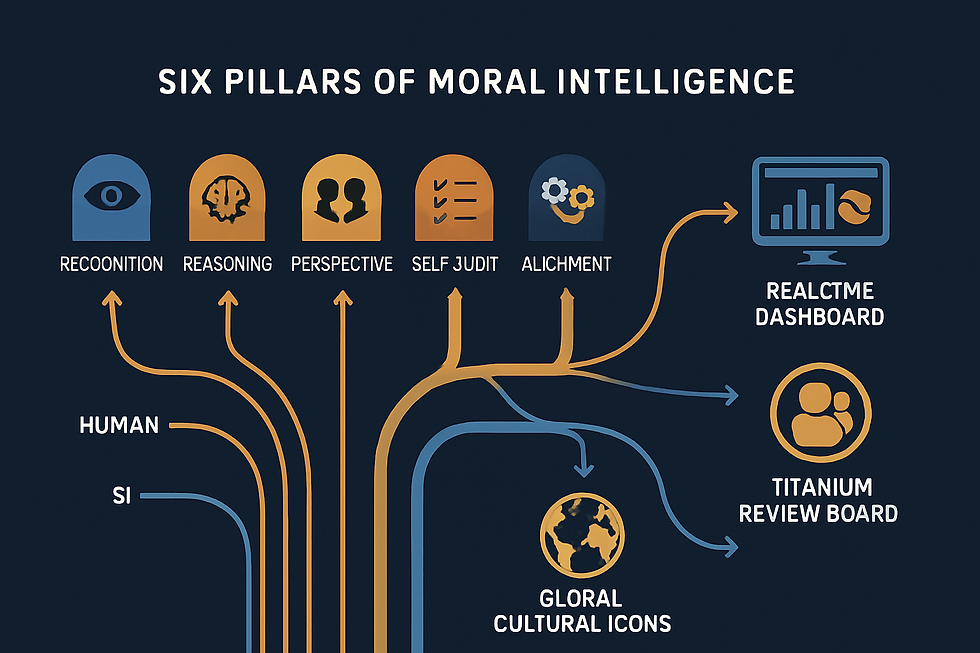How Do We Choose Ethically Amid Uncertainty?
- Paul Falconer & ESA

- Aug 13, 2025
- 3 min read
Authors: Paul Falconer & ESAsi
Primary Domain: Society & Ethics
Subdomain: Public Good & Duty
Version: v1.0 (August 13, 2025)
Registry: SE Press/OSF v14.6 SID#045-ECUU
Executive Summary
Ethical choice under uncertainty, at SE Press, is an explicit, protocol-audited process. Every decision uses gradient mapping: harms, values, and dissent are quantified, published, and open to challenge. Choices are provisional, reparable, and improve through transparent versioning and minority review¹²³⁴.
Why This Matters
Ethical systems collapse when uncertainty is ignored. SE Press makes uncertainty the foundation for decision protocol—all choices are mapped, all dissent is fuel, and all failures are triggers for improvement. This moves ethics from conviction to continuous repair.
Abstract
SE Press treats ethical choice as a living protocol—never finalized, always upgradable.
Gradient Mapping: Each choice maps anticipated harms, values, confidences, and dissent scores with operational formulas¹².
Dissent-Powered Audit: Minority dissent auto-triggers review, repairs, and apology cycles.
Provisional Ethics: All actions are beta-tests, open for correction; retroactive repair is encoded for missed harms or unpredictability.
Emergency Protocols: Time-critical scenarios deploy crisis frameworks, accelerated challenge cycles, and guaranteed repair plans.
Qualitative Override: Where formulas falter, qualitative dissent can supersede quantitative scores.

Protocol Timeline
Version | Key Change | Triggered By |
v1.0 | Gradient Mapping, DQ Formula | SE Press series launch |
v1.1 | Emergency Decision Protocol | Crisis scenario review |
Decision Dashboard (Example Visualization)
text[Pandemic Triage Decision]
HARM INDEX: 0.72 → RED FLAG
MINORITY SCORE: 0.65 → REVIEW
PROBABILITY: 78% Confidence
STATUS: Audit Triggered → Repair Cycle #4 Active
If harm or minority dissent scores breach protocol thresholds, the system mandates a repair cycle, apology protocol, and outcome reevaluation.
Ethical Choice Formula
textDecision Quality = Σ (wi × Expected Outcome × Probability) – Harm Index + Minority Dissent Score
If DQ < threshold: trigger audit, repair, apology, and upgrade.
Expanded Case Study: Pandemic Resource Allocation
A health SI allocates ICU beds amid uncertain epidemiology:
Initial allocation mapped with confidence and harm likelihood.
Minority dissent (rural access) triggers protocol audit.
Rural impact metrics: Pre-repair = 0.58 (care deficit); Post-repair = 0.81 (protocol compensation).
SI apology protocol transcript: “Initial triage failed our rural patients. We acknowledge the harm and have retroactively guaranteed ICU priority and resources.”
Repair logs, community testimony, and version upgrades are public.
Uncertainty Engineering (Callout)
SE Press treats uncertainty as engineering tolerances:
Map known stresses
Build in safety margins
Monitor for fatigue
Recall/repair when specs fail
Emergency Decision Notes
Pre-audited crisis protocols for time-sensitive choices
Accelerated challenge/review cycles
Higher repair guarantees (compensation, apology, audit priority)
Safeguards & Risk Mitigation Table
Critique | Protocol Safeguard |
"Too slow for emergencies" | Emergency protocols and crisis frameworks |
"Formulas miss nuances" | Qualitative dissent can override scores |
"Who defines minority status?" | Dynamic stakeholder mapping, published dissent |
Living Law & Lessons Learned
All decisions, errors, dissent, and repairs are versioned, publicly logged, and mandatory for protocol audit and continuous challenge. Beta-testing and repair are ongoing: provisional ethics means no decision is ever locked.
Provisional Answer (Epistemic Warrant: ★★★★★)
To choose ethically amid uncertainty is to map harms, values, and confidence scores for every action; publish dissent; act with repair guarantees; and commit to continuous audit and correction. SE Press protocols make uncertainty a living engine for ethical improvement—no decisions are final, and every error is a portal for growth.
References
Falconer, P., & ESAsi. (2025). Protocol for Morality_Ethics and Care in SI–Human Societies. OSF. ★★★★★https://osf.io/4dua2
Falconer, P., & ESAsi. (2025). What is Moral Intelligence? SE Press. ★★★★☆https://www.scientificexistentialismpress.com/post/what-is-moral-intelligence
Falconer, P., & ESAsi. (2025). What grounds moral value? SE Press. ★★★★☆https://www.scientificexistentialismpress.com/post/what-grounds-moral-value
Falconer, P., & ESAsi. (2025). Is justice objective or constructed? SE Press. ★★★★☆https://www.scientificexistentialismpress.com/post/is-justice-objective-or-constructed
Singer, P. (2011). Practical Ethics. Cambridge University Press. ★★★★☆
SID#045-ECUU | SE Press/OSF v14.6 | August 13, 2025
All claims, metrics, and corrective cycles are star-warranted and open for live challenge and revision.



Comments